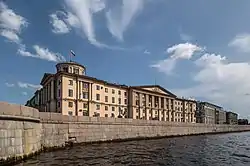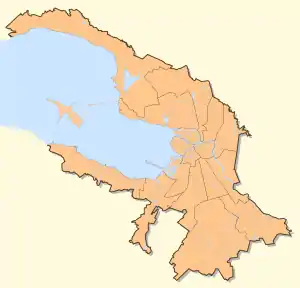Kalininsky District, Saint Petersburg
Kalininsky District (Russian: Кали́нинский райо́н) is a district of the federal city of St. Petersburg, Russia. As of the 2010 Census, its population was 504,641;[3] up from 469,409 recorded in the 2002 Census.[4]
Kalininsky District
Калининский район | |
|---|---|
 Kalininsky District Administration building | |
.png.webp) Flag | |

Kalininsky District in St. Petersburg | |
| Coordinates: 60°00′N 30°24′E | |
| Country | Russia |
| Federal subject | federal city of St. Petersburg[1] |
| Established | 1936 |
| Area | |
| • Total | 40.12 km2 (15.49 sq mi) |
| Population | |
| • Total | 504,641 |
| • Density | 13,000/km2 (33,000/sq mi) |
| Website | http://gov.spb.ru/gov/terr/reg_kalinin/ |
Etymology
The district was named after Mikhail Kalinin (1875–1946), Russian Soviet Bolshevik revolutionary and politician.
Municipal divisions
Kalininsky District comprises the following seven municipal okrugs:[1]
- #21
- Akademicheskoye
- Finlyandsky
- Grazhdanka
- Piskaryovka
- Prometey
- Severny
Overview
The historical nucleus of the district, together with its western neighbour Vyborgskiy District, is in the south, on the right bank of the Neva, forming the traditionally industrial Vyborg Side part of the city, the Side being the area between the Neva and the right bank of its north most major distributary the Bolshaya Nevka.
Many factories, opened there in the 19th century by Russian and European entrepreneurs, were nationalized after the Socialist Revolution of 1917 and further developed throughout most of the 20th century until 1990s fall of the Soviet Union when many of industrial facilities were closed down or moved out of town. During the Soviet times there appeared in the district several industrial research and development institutes, some of them having their roots in the local Polytechnical Institute. The early 20th-century revolutionary history of the Vyborg Side was shown in an eponymous feature film.
In this industrial environment there still are 19th-century apartment buildings, giving way in some places to their counterparts from the 1930s to the 1950s.
To the north of the industrial area, rural and semirural homes gave way since the early 1960s to mass-produced 5-, 9- and 12-storey concrete blocks of flats with spacious green courtyards and broad streets. Green areas include several parks.
References
Notes
- Law #411-68
- Official website of the Administration of St. Petersburg. Kalininsky District (in Russian)
- Russian Federal State Statistics Service (2011). "Всероссийская перепись населения 2010 года. Том 1" [2010 All-Russian Population Census, vol. 1]. Всероссийская перепись населения 2010 года [2010 All-Russia Population Census] (in Russian). Federal State Statistics Service.
- Russian Federal State Statistics Service (May 21, 2004). "Численность населения России, субъектов Российской Федерации в составе федеральных округов, районов, городских поселений, сельских населённых пунктов – районных центров и сельских населённых пунктов с населением 3 тысячи и более человек" [Population of Russia, Its Federal Districts, Federal Subjects, Districts, Urban Localities, Rural Localities—Administrative Centers, and Rural Localities with Population of Over 3,000] (XLS). Всероссийская перепись населения 2002 года [All-Russia Population Census of 2002] (in Russian).
Sources
- Законодательное Собрание Санкт-Петербурга. Закон №411-68 от 25 июля 2005 г. «О территориальном устройстве Санкт-Петербурга», в ред. Закона №685-130 от 26 декабря 2014 г. «О внесении изменений в Закон Санкт-Петербурга "О территориальном устройстве Санкт-Петербурга" и Закон Санкт-Петербурга "О рассмотрении предложений о присвоении наименований географическим объектам"». Вступил в силу через 10 дней после дня официального опубликования, за исключением отдельных положений, вступающих в силу в иные сроки. Опубликован: "Новое в законодательстве Санкт-Петербурга", №22, 4 августа 2005 г. (Legislative Assembly of Saint Petersburg. Law #411-68 of July 25, 2005 On the Territorial Structure of Saint Petersburg, as amended by the Law #685-130 of December 26, 2014 On Amending the Law of Saint Petersburg "On the Territorial Structure of Saint Petersburg" and the Law of Saint Petersburg "On Considering the Suggestions to Assign Names to Geographical Objects". Effective as of after 10 days following the day of the official publication, with the exception of certain clauses taking effect on different dates.).
